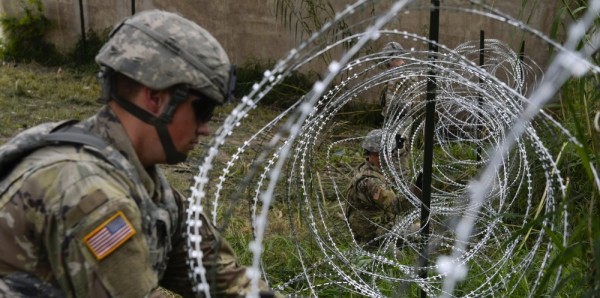

The U.S. military’s mission involving roughly 8,000 active-duty troops being deployed to the southwest border to stop asylum seekers from crossing into the United States no longer has a name.
“We are not calling it ‘Operational Faithful Patriot,’” Pentagon spokesman Army Lt. Col. Jamie Davis said on Wednesday. “We are calling it ‘border support.’”
Davis declined to say why the Defense Department has deep sixed the name “Operational Faithful Patriot” or provide any further information on the matter. The Wall Street Journal first reported on Wednesday that the border deployment is no longer named.
Roughly 5,600 active-duty troops have deployed to California, Arizona, and Texas, said NORTHCOM spokesman William Lewis. Of those, 1,265 are in California, 1,502 are in Arizona, and 2,844 are in Texas.
Another 1,100 Marines from Camp Pendleton have been notified that they will likely become part of the mission, Lewis said. They had lot left Pendleton as of Wednesday afternoon.
Those active-duty troops with spouses and children are deployed for more than a month are eligible to receive a family separation allowance of $250 per month, said Army Col. Robert Manning, a Pentagon spokesman.
But troops deploying to the U.S./Mexico border will not receive imminent danger pay or hostile fire pay, Manning said on Tuesday.
“Imminent danger pay is paid to members on duty in foreign areas, designated as such because of wartime conditions, civil war, civil insurrection, or terrorism,” Manning said. “Our military will not receive combat pay or hostile fire pay as they are not deploying to a combat area, nor are they expected to be subject to hostile fire.”
Marine Gen. Joseph Dunford, chairman of the Joint Chiefs of Staff, recently made clear that the active-duty troops on the southwestern border are strictly providing transportation as well as logistical and medical support to civil authorities.
“There is no plan for U.S. military forces to be involved in the actual mission of denying people entry to the United States,” Dunford said on Monday at Duke University. “There is no plan for soldiers to come in to contact with immigrants or to reinforce the Department of Homeland Security as they are conducting their mission. We are providing enabling capabilities.”
SEE ALSO: Trump’s Border Deployments Could Actually Harm The Military’s Readiness
WATCH NEXT: